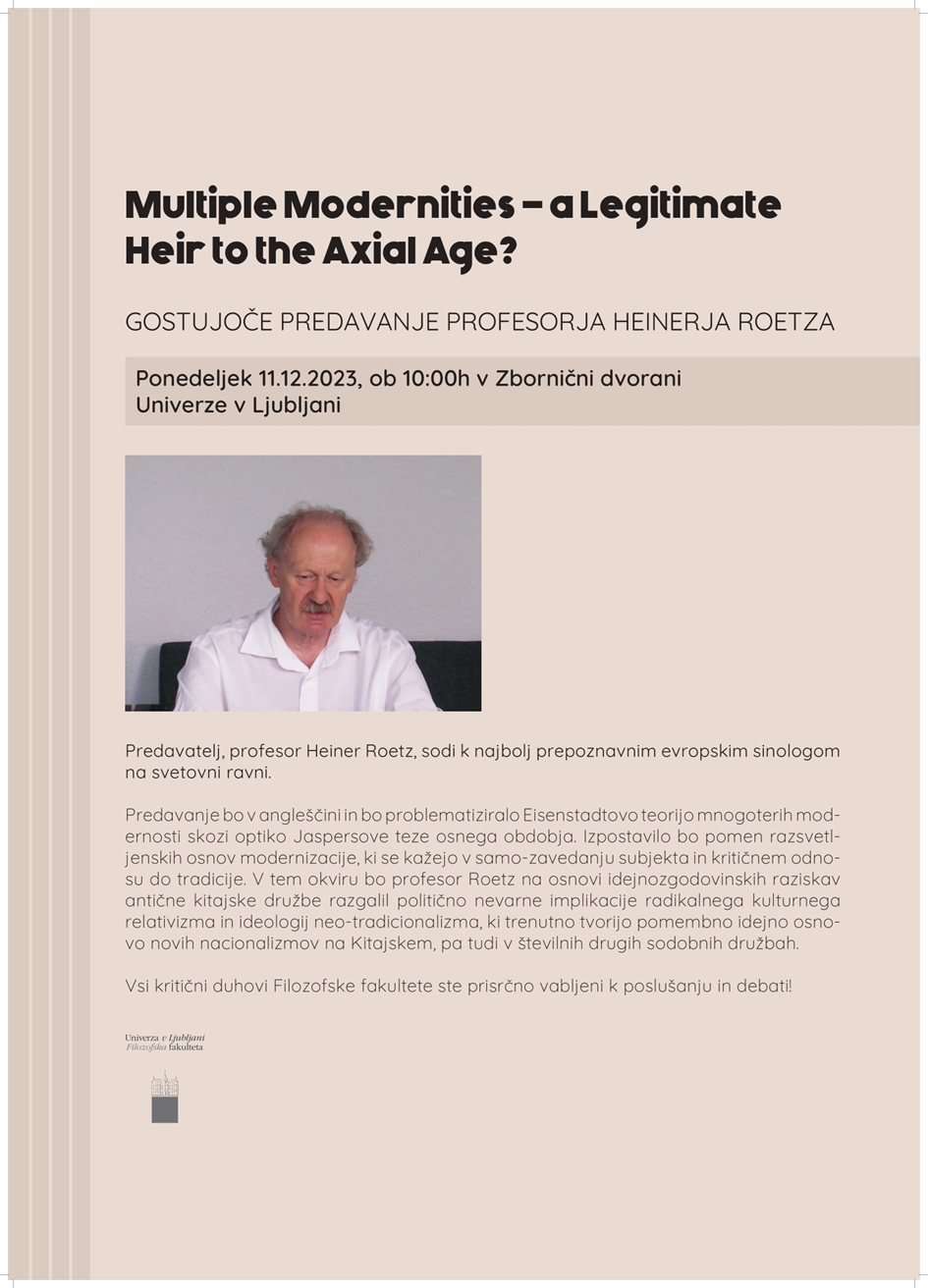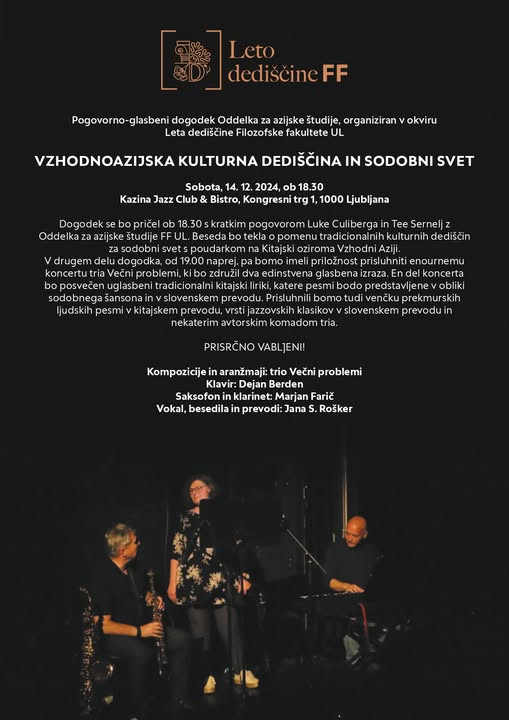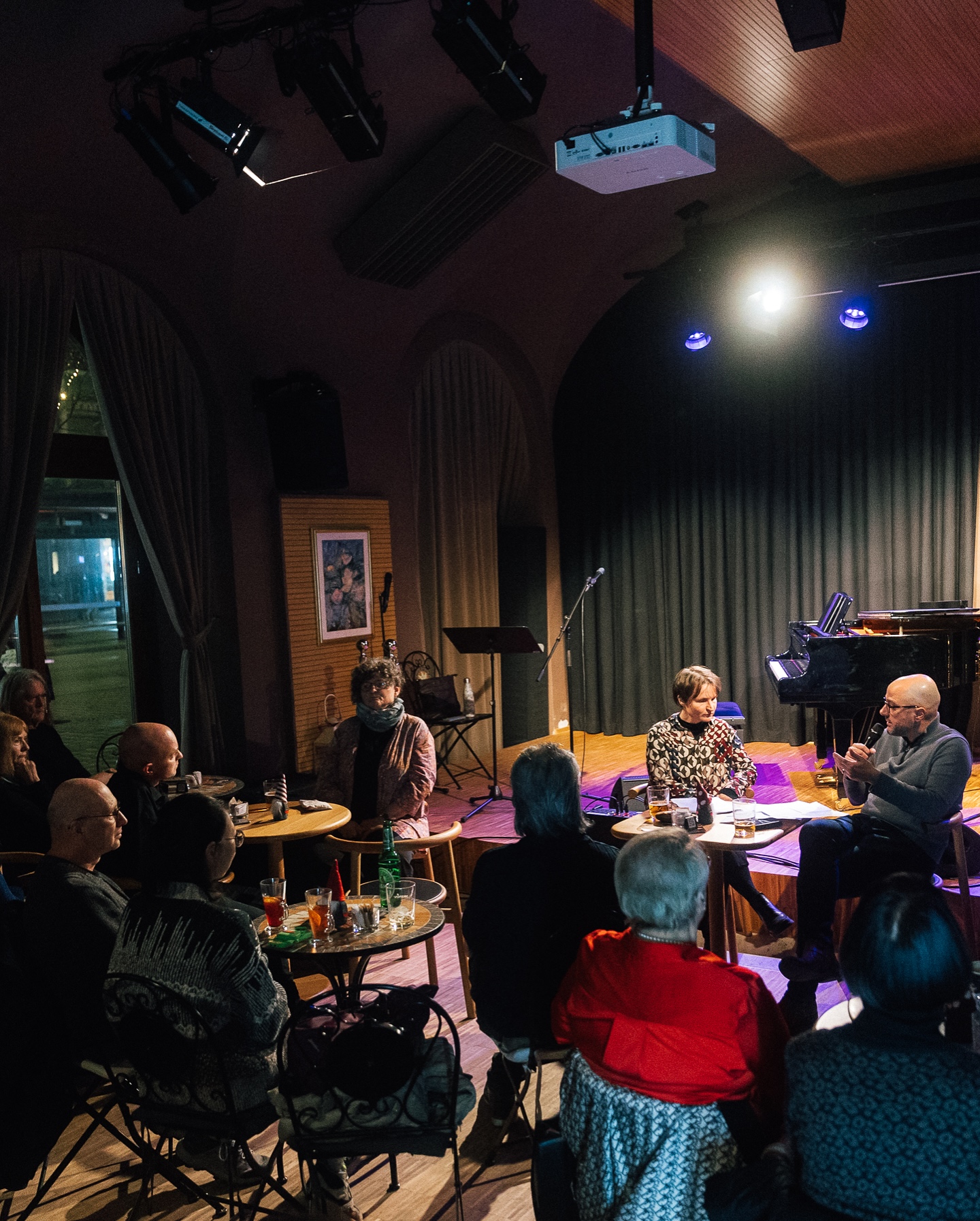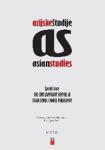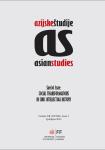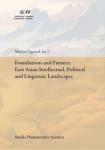
| Članica UL, ki izvaja projekt | UL, Filozofska fakulteta |
| Evidenčna številka projekta (šifra) | J6-50202 |
| Naziv projekta | The Confucian Revival and its Impact on Contemporary East Asian Societies Through the Lens of the Relation between Individual and Society (Konfucijanski preporod in njegov vpliv na sodobne vzhodnoazijske družbe skozi prizmo odnosa med individuumom in družbo) |
| Obdobje trajanja projekta | 1.10.2023 – 31.9.2026 |
| Letni obseg | 1,19 FTE |
| Vodja projekta | izr. prof. dr. Tea Sernelj |
| Veda in raziskovalno področje po šifrantu ARIS | 6.06 Humanistika/Kulturologija |
| Sodelujoče raziskovalne organizacije | / |
Vsebinski opis projekta
Konfucijanska etika in konfucianistična državna doktrina predstavljata pomembno kulturno dediščino celotne vzhodnoazijske tradicije. Konfucijanski preporod, ki se je v teh regijah razvijal od zgodnjega 20. stoletja naprej kot idejni temelj specifične vzhodnoazijske modernizacije, predstavlja pomemben mejnik pričetka redefinicije idejnih osnov vzhodnoazijskih družb in njihovega odnosa do lastne zgodovine in tradicije. Pri tem gre za strujo prenove tradicionalnih miselnosti, ki merodajno opredeljevala duh vzhodnoazijske modernizacije. Ta struja se je kazala v poskusih revitalizacije tradicionalnih idejnih sistemov s pomočjo novih impulzov zahodnih miselnosti. Alternative obstoječim razvojem, ki so tudi v modernizaciji Azije vodili do tendenc socialne odtujenosti in takim. »vakuuma vrednot«, iščejo sodobni konfucijanci predvsem v ogrodju klasične konfucijanske miselnosti. Preporod konfucijanstva torej temelji na prizadevanjih za takšno modernizacijo vzhodnoazijske tradicije, ki je ne bi bilo možno enačiti s popolnim pozahodenjem družbenih stvarnosti teh regij, temveč bi bila osnovana na moderniziranih in prenovljenih konceptih, ki ustrezajo družbeni realnosti in miselnosti teh regij.
Zato ni čudno, da izhajajo osrednje teoretske teze modernega konfucijanstva iz prepričanja, da lahko konfucijanstvo kot temelj specifično kitajske socialne, politične in moralne miselnosti - seveda v prenovljeni, pogojem moderne dobe ustrezajoči obliki - služi kot temelj etičnega osmišljenja sodobnega življenja in kot zdravilo proti odtujenosti, ki je razumljena kot stranski proizvod kapitalističnega poveličevanja konkurence ter gonje za dobičkom.
V sklopu preučevanja sodobnih konfucijanskih teorij, ki so plod prizadevanja za modernizacijo, prilagojeno azijskim družbenim in idejnim razmeram, se bo projekt zato osredotočil na preporod konfucijanske etike in predvsem na vprašanje o tem, kakšna je vloga individuuma znotraj takim. konfucijanskega relacionizma, ki predstavlja alternativo takšnim modelom etike in politične teorije, ki izhajajo iz različnih inačic individualističnih paradigem.
Splošni vidiki koncepta takim. relacijskega sebstva, ki predstavlja psihološko in ontološko osnovo tovrstne idejne zasnove posameznika, so v znanstveni literaturi tega področja že precej dobro raziskani in ovrednoteni. Vendar to velja predvsem za raziskave klasičnih virov in virov sodobnega konfucijanstva na Tajvanu in na kitajski celini, ki se nanašajo na univerzalne elemente konfucijanske strukture razmerja med posameznikom/posameznico in družbo ali družbeno skupnostjo.
Za celostno in bolj avtohtono razumevanje prepletov sodobnosti in tradicije v tej regiji (in s tem za možnosti izboljšanja kulturnih, ekonomskih in političnih odnosov z državami te regije) pa potrebujemo bolj diferencirane vpoglede v posebnosti posamičnih, regionalno in kulturno pogojenih, specifik modernizacije skupne konfucijanske dediščine. V okviru predlaganega projekta nas zato zanimajo tudi različni kulturno opredeljeni konteksti družbenih vlog posameznika in posameznice skozi optiko tradicionalnih konfucijanskih etičnih izhodišč, ki se kažejo v posebnostih družbene stvarnosti sodobne Kitajske, Koreje, Japonske in Tajvana. Izhajali bomo iz že obstoječih raziskav osrednje linije konfucijanskega preporoda, ki se je pričel na Tajvanu, v Hongkongu, pa tudi v nekaterih drugih sinofonih območjih vzhodnoazijske regije, ter jih razvijali skozi kontrastno analizo in primerjavo sorodnih razvojev v Koreji in na Japonskem, kjer so topogledne raziskave še v povojih.
Ker sodijo vodja projekta in vsi člani projektne skupine med najboljše strokovnjake na področju vzhodnoazijskih študij in vzhodnoazijskega konfucijanstva v Sloveniji (vodja in ena članica sta sinologinji, člana pa sta japonolog in koreanist), je ta cilj brezdvomno uresničljiv. Njegov pomen pa se kaže v razvoju medkulturnih izmenjav in dialogov z Vzhodno Azijo, ki so v današnjem globaliziranem svetu bolj potrebne kot kadarkoli poprej. Poleg tega je učinkovita medkulturna komunikacija, ki predstavlja sekundarni rezultat tega projekta, ključna za Evropo z njenim raznolikim kulturnim, jezikovnim in tradicionalnim ozadjem.
//////////////////////////////////////////////////////
Confucianism is a widespread cultural heritage in East Asia and its revival in the early 20th century had a significant impact on redefining the cultural and ideological foundations of modern East Asian societies. Its revival, which manifests itself in the Modern New Confucian stream of thought (现代新儒学), aimed to modernize traditional Confucian ideas by incorporating Western theories while still maintaining its core values. The current is defined as the search for a synthesis between Western and traditional East Asian thought, in order to elaborate a system of ideas and values capable of resolving the social and political problems of the modern, globalized world. The intellectuals belonging to this stream of thought, have namely attempted to reconcile “Western” and “traditional Chinese” values, in order to create a theoretical model of modernization that would not be confused or equated with “Westernization”.
The current of Modern New Confucianism has been well-researched in the Sinophone sphere, including Mainland China, Taiwan, and Hong Kong. However, despite its significant influence in other East Asian regions such as Korea and partly also Japan, the research on Modern Confucianism and its impact in these areas is limited. This calls for further investigation and examination of the subject to gain a comprehensive understanding of its development and impact in the wider East Asian region. Hence, the proposed project aims to provide a comprehensive examination of Modern New Confucianism by studying its theoretical approaches, ideas, and methods, as well as exploring the political, social, and ideological context of the Confucian revival and its specificities in Taiwan, Hong Kong, China, Korea, and Japan.
Our research will first establish the global significance and intercultural framework of the subject matter and then move on to examine the general characterization of East Asian modernity and the historical and political conditions that shaped its multifaceted modernization processes. Our study will proceed from the Confucian ethics, particularly in the form of traditional “relationism," which is based on a specific form of role-ethics. This model of social ethics is rooted in the concept of the so-called “relational self”, which emphasizes the importance of relationships in shaping the individual's identity.
On this basis, we will highlight any culturally divergent issues that may arise. In this regard, we will particularly focus upon the investigation of two agendas: firstly, we aim to shed light upon the question of why and in which specific ways the relicts of traditional Confucianism influence modern East Asian societies in spite of their different political and social systems. Subsequently, we shall elaborate upon different structures of the relation between the individual and the society in all regions under observation. This examination will provide a nuanced understanding of the complex relationship between the Confucian revival and the development of East Asian contemporalities.
The project team, consisting of four well-known experts in East Asian Confucianism (two Sinologists, an expert in Korean studies and one in Japanese studies) will study the interweaving of modernity and tradition in East Asia, striving for a comprehensive understanding of the modernization of Confucian heritage and its different manifestations in Korea, Japan, China Taiwan, and Hong Kong. The goal is to foster intercultural exchanges to enhance cultural, economic, and political ties with East Asia and to promote intercultural awareness and sensitivity in the context of multiple modernities. This is important given the current globalized nature of the world's crises, which require intercultural cooperation and exchange of knowledge, experiences, and ideas. Additionally, effective cross-cultural communication, a secondary outcome of this project, is crucial for Europe, with its diverse cultural, linguistic, and traditional backgrounds.
izr. prof. dr. Tea Sernelj, red. prof. dr. Jana S.Rošker, doc. dr. Kang Byoung Yoong, asist. dr. Marko Ogrizek
ČASOVNICA PROJEKTA
|
SEGMENTI RAZISKOVANJA (RS) |
Tasks |
Period 1 (2023 - 2024) |
Period 2 (2024 - 2025) |
Period 3 (2025 - 2026) |
|
RS 1 Raziskovanje v arhivih, terensko delo in mreženje
|
|
√ |
√ |
√ |
|
√ |
√ |
√ |
|
|
|
√ |
√ |
|
|
|
√ |
|
|
|
RS 2 Organizacija akademskih srečanj
|
|
√ |
|
√ |
|
|
√ |
|
|
|
√ |
|
√ |
|
|
|
√ |
|
|
|
RS 3 Vodenje projekta in poročanje
|
|
√ | ||
|
|
√ |
√ |
|
|
|
|
√ |
|
|
|
√ |
√ |
|
|
RS 4 Rezultati (publikacije, predstavitve, učni načrti in študije).
|
|
|
√ |
√ |
|
|
|
√ |
|
|
|
√ |
√ |
|
|
√ |
|
√ |
|
|
|
√ |
√ |
|
|
RS 5 Diseminacija (druge oblike) |
|
√ |
√ |
√ |
|
√ |
√ |
√ |
|
|
|
√ |
√ |
|
|
|
|
√ |
Realizacija v obdobju od 01.10.2023 do 01.03.2025
Kvantitativno poročilo s šiframi COBISS
Pričujoče poročilo sledi točkam, navedenim v prijavi projekta. Te točke so razvidne iz časovnice, ki se nahaja na koncu projektne prijave, najdete pa jo lahko tudi na spletni strani projekta (https://as.ff.uni-lj.si/konfucijanski-preporod-njegov-vpliv-na-sodobne-vzhodnoazijske-druzbe-skozi-prizmo-odnosa-med) pod rubriko Faze projekta in njihova realizacija. Pričujoče poročilo se nanaša na prvo fazo projekta (2023-24), ki je trajala od 01.10.2023- pričujočega poročila, tj. do marca 2025. Kot je razvidno iz razmerja med cilji, načrtovani v časovnici na eni strani, in doseženimi rezultati na drugi, so bili vsi načrtovani cilji prvega obdobja ne samo doseženi, temveč delno tudi preseženi. Spodaj navajamo podrobno poročilo, ki sledi v prijavi navedenim razdelkom s šiframi od RS 1 do RS 5, ki se nanašajo na posamične segmente raziskovalnega dela.
RS 1 - Raziskovanje v arhivih, terensko delo in mreženje
Četudi smo tukaj za prvo obdobje raziskovalnega dela načrtovali zgolj raziskovalna bivanja v Evropi in na Kitajskem, smo izvajali raziskave ter terensko delo tudi v ostalih regijah Vzhodne Azije (Japonska, Hongkong in Južna Koreja) ter v ZDA. V okviru mreženja velja omeniti naše udeležbe na konferencah in naša vabljena gostujoča predavanja v vseh teh regijah, saj obe obliki aktivnosti prav tako veliko prispevajo k razjasnitvi nekaterih temeljnih vsebinskih vprašanj našega projekta (gl. [COBISS.SI-ID 221349635, 208578307, 221353475, 208574467, 173420291, 161063171, 151287299, 217345027, 204679427, 204679683, 197549571, 217342723 , 216244995, 196916995, 201405955, 199040259, 186284035, 212372995, 200266755, 208581123, 154610179, 183737603, 160520963, 220106243, 186963459, 184860931, 184862723, 160521731, 184962051, 194436867, 202870019, 194438147, 194441475, 194442499, 201791491, 217344259, 194444035, 183790339].
RS 2 - Organizacija akademskih srečanj
Za to obdobje smo načrtovali zgolj organizacijo ene delavnice, ki smo jo tudi uspešno organizirali (228809475). Poleg tega pa smo v tem obdobju organizirali tudi dve mednarodni konferenci (152257795, 196770819) in dva simpozija (153593347, 217340931), kar pomeni, da smo pričakovane rezultate tudi v tem segmentu precej presegli.
RS 3 - Vodenje projekta in poročanje
V tem segmentu smo načrtovali eno začetno srečanje, dva sestanka (eden ob začetku vsake nove faze projekta), ter eno končno srečanje. Ob vsakem srečanju si poročamo o doslej opravljenem delu in skupaj načrtujemo ter koordiniramo delo v naslednjih fazah projektnega dela. Doslej smo izvedli začetno srečanja in en vmesni sestanek. (Ker gre za interna srečanja, pri tej točki ni vpisov v COBISS).
RS 4 - Rezultati (publikacije, predstavitve, učni načrti in študije)
Tudi pri trem segmentu smo zdaleč presegli načrtovane rezultate, saj smo v prvi fazi projekta objavili
-
6 znanstvenih člankov: 5 izvirnih znanstvenih člankov [COBISS.SI-ID 225534211, 225534467, 194797827, 208076803, 207704067] in en pregledni znanstveni članek [COBISS.SI-ID 182610179].
-
4 samostojna poglavja v monografijah [COBISS.SI-ID 227989251, 225859075, 225860867, 219116547].
-
1 posebno številko znanstvene revije [COBISS.SI-ID 205309699]
-
1 uredništvo znanstvene monografije (zbornika) [COBISS.SI-ID 217930499]
-
1 avtorska znanstvena monografija
RS 5 - Diseminacija (druge oblike)
Zelo aktivni smo bili tudi pri diseminaciji projekta. Pri konferenci, ki smo jo organizirali v prvi fazi projekta v maju 2024 [COBISS.SI-ID 196770819], smo kot spremljajoči kulturni program uprizorili gledališko igro o vzhodnoazijski filozofiji s fokusom o razmerju med posameznikom in skupnostjo. Na ta način smo projektno temo (in njen pomen za Evropo) približali širši javnosti (gl., spletno stran konference, rubriko Theater Performance: https://as.ff.uni-lj.si/en/does-nothingness-exist-cross-continental-dialogue ). V decembru 2024 smo poleg tega organizirali in izvedli okroglo mizo na temo vzhodnoazijskih kulturnih dediščin s poudarkom na vlogo konfucijanstva pri oblikovanju sodobnih struktur družbe. Okrogli mizi je sledil koncert s prevodi kitajske konfucijanske in daoistične filozofske lirike v slovenščino (gl. [COBISS.SI-ID 226252803]
Kvalitativno vsebinsko poročilo
Zgoraj smo navedli številčne (kvantitativne) podatke o aktivnostih in publikacijah naše projektne skupine v fazah projekta, na katere se nanaša to poročilo, t.j. od 01.10.1023 do konca marca 2025. Vse te podatke smo – tam, kjer je bilo to možno, - opremili s številkami vpisov v COBISS. Zaradi omejitve znakov nismo podajali opisov posamičnih rezultatov projektnega dela; kar se tiče publikacij, bomo to tako ali tako storili v točki, v kateri bomo navedli najpomembnejše dosežke.
Spodaj pa navajamo skupne vsebinske rezultate dosedanjega projektnega dela, ki se odraža v vseh publikacijah in ostalih aktivnostih skupaj.
Kljub obilici literature v korejščini, japonščini in zlasti v kitajščini so koherentne akademske študije o sodobnem konfucijanstvu v zahodnih jezikih še vedno redke, zlasti kar se tiče akademskih interakcij med sinofonim svetom na eni strani ter Korejo in Japonsko na drugi. Primarni cilj tega projekta je zato bil v temeljitem preučevanju tega gibanja, ki si prizadeva za prepletanje zahodnih in kitajskih vrednot ter oblikovanje specifičnega modela vzhodnoazijske modernizacije. Že v zasnovi projekta smo načrtovali, da bomo svoje ugotovitve vseskozi širili v zahodno akademsko skupnost ter s tem prispevali k razpravam o novi globalni oziroma planetarni etiki z vključitvijo spoznanj in vpogledov, pridobljenih v naših raziskavah. Že v prvi fazi dela smo posebno pozornost namenili temam in področjem, ki so bila doslej premalo raziskana, zlasti procesom širitve tega kulturnega in filozofskega gibanja v Vzhodni Aziji ter interakcijam in vzajemnim vplivom med njegovimi ključnimi zagovorniki.
V vsebinskem smislu smo svoje raziskave strukturirali okoli vprašanja geopolitičnih, kulturnih in zgodovinskih razlik med različnimi pogledi modernega novega konfucianizma na razmerje med posameznikom in družbo. To vprašanje je pomembno, saj te razlike vplivajo na način, kako ljudje razumejo in komunicirajo drug z drugim, ter oblikujejo politične, socialne in ekonomske sisteme. Razumevanje teh razlik lahko vodi do globljega spoštovanja raznolikih perspektiv ter olajša komunikacijo in sodelovanje v različnih kulturnih in zgodovinskih kontekstih. S pojasnjevanjem razmerja med posameznikom in družbo smo v številnih člankih in poglavjih v monografijah omogočili bolj osredotočene in produktivne razprave v teh disciplinah med različnimi kulturami in državami.
Osvetlitev skupnih točk in inherentne vzajemne povezanost različnih (političnih, zgodovinskih, ekonomskih, lingvističnih in filozofskih) faktorjev v raznolikem imaginariju konfucijanstva se je še prav posebej jasno pokazala v rdeči niti vseh prispevkov, zbranih v posebni številki znanstvene revije Asian Studies z naslovom Social transformations in Sinic intellectual history [COBISS.SI-ID 205309699], ki jo je uredila vodja projekta Tea Sernelj, ter prispevkov, zbranih v zborniku Foundations and Futures: East Asian Intellectual, Political and Linguistic Landscapes.
Ugotovitve raziskovalnega projekta so bile že v prvi fazi projektnega dela objavljene prek različnih kanalov, vključno z več recenziranimi članki v vodilnih akademskih revijah, pa tudi v prej omenjenem zborniku in posebni številki znanstvene revije, ki sta obravnavala različne vidike konfucijanske prenove. Tukaj velja omeniti tudi znanstveno monografijo članice projektne skupine Jane Rošker, ki nosi naslov Anarhizem na Kitajskem na pragu 20. stoletja: Primerjalna raziskava o teoriji države in anarhističnih idejah v kitajski in zahodni tradiciji. [COBISS.SI-ID 195962883] Za pričujoči projekt je ta knjiga zelo pomembna, saj razjasni ozadje novejše politične zgodovine in njenih filozofskih osnov, ki so merodajno vplivali na zagon Modernega konfucijanstva ne zgolj na Kitajskem, temveč v celotni Vzhodni Aziji.
Celotna bibliografija članic in članov projekta je dostopna na tej povezavi: https://bib.cobiss.net/bibliographies/si/webBiblio/bib351_20250316_095751_j6-50202.html.
- SERNELJ, Tea. In defence of subjectivity and autonomy : Shitao’s aesthetic theory and his critique of the mainstream school of painting in the Early Qing Dynasty. Asian studies. [Print ed.]. 2024, vol. 12 (28), iss. 2, str. 145-169. ISSN 2232-5131. https://journals.uni-lj.si/as/article/view/16517/15587, Repozitorij Univerze v Ljubljani – RUL, Digitalna knjižnica Slovenije - dLib.si. [COBISS.SI-ID 194797827], [Odprti dostop, SNIP] projekt: J6-50202-2023 Konfucijanski preporod in njegov vpliv na sodobne vzhodnoazijske družbe skozi prizmo odnosa med individuumom in družbo; financer: Javna agencija za znanstvenoraziskovalno in inovacijsko dejavnost Republike Slovenije projekt: RG001-N-23 The problem of freedom, humanismand the human subject in intercultural perspective: Europe and Taiwan kategorija: 1A1 (Z, A'', A', A1/2); uvrstitev: Scopus (h), Scopus (d), MBP (DOAJ, ERIHPLUS, ESCI)
- SERNELJ, Tea. The rise of individual personhood in early medieval China. Asian studies. [Print ed.]. 2024, vol. 12 (28), iss. 3, str. 131-149. ISSN 2232-5131. https://journals.uni-lj.si/as/article/view/18910/16220, Repozitorij Univerze v Ljubljani – RUL. [COBISS.SI-ID 208076803], [Odprti dostop, SNIP] projekt: J6-50202-2023 Konfucijanski preporod in njegov vpliv na sodobne vzhodnoazijske družbe skozi prizmo odnosa med individuumom in družbo; financer: Javna agencija za znanstvenoraziskovalno in inovacijsko dejavnost Republike Slovenije, projekt: P6-0243-2019 Azijski jeziki in kulture; financer: Javna agencija za znanstvenoraziskovalno in inovacijsko dejavnost Republike Slovenije projekt: RG001-N-23 The problem of freedom, humanismand the human subject in intercultural perspective: Europe and Taiwan kategorija: 1A1 (Z, A'', A', A1/2); uvrstitev: Scopus (h), Scopus (d), MBP (DOAJ, ERIHPLUS, ESCI)
- SERNELJ, Tea. Modern new Confucian philosophy after 1949. V: AMBROGIO, Selusi (ur.), ROGACZ, Dawid (ur.). Chinese philosophy and its thinkers. Volume 3, Chinese philosophy from the eighteenth century to the present. London: Bloomsbury Academic, cop. 2024. Str. 249-267. ISBN 978-1-35-026373-4, ISBN 978-1-35-026377-2. Repozitorij Univerze v Ljubljani – RUL. [COBISS.SI-ID 219116547]
kategorija: 3B (Z, A1/2 projekt: J6-50202-2023 Konfucijanski preporod in njegov vpliv na sodobne vzhodnoazijske družbe skozi prizmo odnosa med individuumom in družbo; financer: Javna agencija za znanstvenoraziskovalno in inovacijsko dejavnost Republike Slovenije
projekt: P6-0243-2019 Azijski jeziki in kulture; financer: Javna agencija za znanstvenoraziskovalno in inovacijsko dejavnost Republike Slovenije
projekt: RG001-N-23 The problem of freedom, humanism and the human subject in intercultural perspective: Europe and Taiwan - SERNELJ, Tea. Introduction. Asian studies. [Print ed.]. 2024, vol. 12 (28), iss. 3, str. 7-11. ISSN 2232-5131. https://journals.uni-lj.si/as/article/view/19620/16215. [COBISS.SI-ID 208077827], [SNIP]
kategorija: SU (S); uvrstitev: Scopus (h), Scopus (d), MBP (DOAJ, ERIHPLUS, ESCI) - ROŠKER, Jana S. Sublating humanism : the relation between the individual and society in Confucian ethics. Asian studies. [Print ed.]. 2024, vol. 12 (28), iss. 3, str. 211-227. ISSN 2232-5131. https://journals.uni-lj.si/as/article/view/18586/16226, Repozitorij Univerze v Ljubljani – RUL, DOI: 10.4312/as.2024.12.3.211-227. [COBISS.SI-ID 207704067], [Odprti dostop, SNIP, WoS, Scopus]
projekt: J6-50208-2023 Novi teoretski pristopi k primerjalni transkulturni filozofiji in metoda sublacije; financer: Javna agencija za znanstvenoraziskovalno in inovacijsko dejavnost Republike Slovenije
projekt: J6-50202-2023 Konfucijanski preporod in njegov vpliv na sodobne vzhodnoazijske družbe skozi prizmo odnosa med individuumom in družbo; financer: Javna agencija za znanstvenoraziskovalno in inovacijsko dejavnost Republike Slovenije
kategorija: 1A1 (Z, A'', A', A1/2); uvrstitev: Scopus (h), Scopus (d), MBP (DOAJ, ERIHPLUS, ESCI) - ROŠKER, Jana S. Methodological concerns in studying Chinese philosophy. V: AMBROGIO, Selusi (ur.), ROGACZ, Dawid (ur.). Chinese philosophy and its thinkers. Volume 1, Ancient and early imperial Chinese philosophy. London: Bloomsbury Academic, cop. 2024. Str. 13-34. ISBN 978-1-35-026354-3, ISBN 978-1-35-026377-2. [COBISS.SI-ID 219113731] kategorija: 3B (Z, A1/2) projekt: J6-50202-2023 Konfucijanski preporod in njegov vpliv na sodobne vzhodnoazijske družbe skozi prizmo odnosa med individuumom in družbo; financer: Javna agencija za znanstvenoraziskovalno in inovacijsko dejavnost Republike Slovenije
projekt: P6-0243-2019 Azijski jeziki in kulture; financer: Javna agencija za znanstvenoraziskovalno in inovacijsko dejavnost Republike Slovenije - ROŠKER, Jana S. Li Zehou and contemporary Chinese aesthetics. V: AMBROGIO, Selusi (ur.), ROGACZ, Dawid (ur.). Chinese philosophy and its thinkers. Volume 3, Chinese philosophy from the eighteenth century to the present. London: Bloomsbury Academic, cop. 2024. Str. 311–330. ISBN 978-1-35-026373-4, ISBN 978-1-35-026377-2. [COBISS.SI-ID 219115523] kategorija: 3B (Z, A1/2) projekt: J6-50202-2023 Konfucijanski preporod in njegov vpliv na sodobne vzhodnoazijske družbe skozi prizmo odnosa med individuumom in družbo; financer: Javna agencija za znanstvenoraziskovalno in inovacijsko dejavnost Republike Slovenije
projekt: P6-0243-2019 Azijski jeziki in kulture; financer: Javna agencija za znanstvenoraziskovalno in inovacijsko dejavnost Republike Slovenije - ROŠKER, Jana S. Anarhizem na Kitajskem na pragu 20. stoletja : primerjalna raziskava o teoriji države in anarhističnih idejah v kitajski in zahodni tradiciji. 1. e-izd. Ljubljana: Založba Univerze, 2024. 1 spletni vir (1 datoteka PDF (281 str.)). Zbirka Studia Humanitatis Asiatica. ISBN 978-961-297-343-8. ISSN 2820-3445. https://ebooks.uni-lj.si/ZalozbaUL/catalog/view/603/977/10245, Repozitorij Univerze v Ljubljani – RUL, Digitalna knjižnica Slovenije - dLib.si, DOI: 10.4312/9789612973438. [COBISS.SI-ID 195883779]
projekt: P6-0243-2019 Azijski jeziki in kulture; financer: Javna agencija za znanstvenoraziskovalno in inovacijsko dejavnost Republike Slovenije
projekt: J6-50208-2023 Novi teoretski pristopi k primerjalni transkulturni filozofiji in metoda sublacije; financer: Javna agencija za znanstvenoraziskovalno in inovacijsko dejavnost Republike Slovenije
projekt: J6-50202-2023 Konfucijanski preporod in njegov vpliv na sodobne vzhodnoazijske družbe skozi prizmo odnosa med individuumom in družbo; financer: Javna agencija za znanstvenoraziskovalno in inovacijsko dejavnost Republike Slovenije
kategorija: 2A (Z, A', A1/2) 2024. 1. Pregledni znanstveni članek: ROŠKER, Jana S. Research on the Confucian revival in Slovenia. Asian studies. [Print ed.]. 2024, vol. 12 (28), iss. 1, str. 287–304. ISSN 2232-5131. https://journals.uni-lj.si/as/article/view/16183/15267, https://repozitorij.uni-lj.si/IzpisGradiva.php?id=154132 , DOI: 10.4312/as.2024.12.1.287-304. [COBISS.SI-ID 182610179], [SNIP] ; financer: AARS, Raziskovalni program, AJK, Azijski jeziki in kulture, P6-0243; ARIS, J6-50202, Konfucijanski preporod in njegov vpliv na sodobne vzhodnoazijske družbe skozi prizmo odnosa med individuumom in družbo Kategorija: 1A1 (Z, A'', A', A1/2); uvrstitev: Scopus (h), Scopus (d), MBP (DOAJ, ERIHPLUS, ESCI); - KANG, Byoung Yoong. Beyond Confucian constraints : the protestant christian perspective in Na Hye-Seok’s literary and artistic endeavours. Reliègiski-filozofiski raksti. 2025, xxxvi, special, str. 27-60. ISSN 1407-1908. https://zenodo.org/records/14750618. [COBISS.SI-ID 225534467]
- KANG, Byoung Yoong. Unveiling Koreanness in Yoon Ha Lee’s Dragon Pearl : cultural representation and translation strategies. Acta linguistica asiatica. 2025, vol. 15, no. 1, str. 153-176. ISSN 2232-3317. https://journals.uni-lj.si/ala/article/view/19745, DOI: 10.4312/ala.15.1.153-176. [COBISS.SI-ID 225534211]
Znanstvena srečanja
Mednarodna konferenca: Does Nothingness exist? A Cross-Continental Dialogue
https://as.ff.uni-lj.si/en/does-nothingness-exist-cross-continental-dialogue
International conference hosted by the Department of Asian Studies, Faculty of Arts, University of Ljubljana, the International Society of Chinese Philosophy (ISCP), and the European Association of Chinese Philosophy (EACP), University of Ljubljana, May 17-19, 2024
SERNELJ, Tea. Modern New Confucians on nothingness and non-being: interpretation by Fang Dongmei and Cheng Chung-yings. V: LORENČIČ, Severin (ur.), AMBROGIO, Selusi. Does Nothingness Exist? : a cross-continental dialogue : program and book of abstracts from the conference : Ljubljana, May 17-20, 2024. 1st e-ed. Ljubljana: Založba Univerze, 2024. Str. 48-49. ISBN 978-961-297-330-8. https://as.ff.uni-lj.si/en/does-nothingness-exist-cross-continental-dialogue. [COBISS.SI-ID 200268291]
projekt: P6-0243; financer: ARIS
projekt: J6-50208; financer: ARIS
projekt: J6-50202; financer: ARIS
ROŠKER, Jana S. From fundamental absence to absolute nothingness : sublating Nishida Kitaro‘s and Wang Bi‘s meontologies. V: LORENČIČ, Severin (ur.), AMBROGIO, Selusi. Does Nothingness Exist? : a cross-continental dialogue : program and book of abstracts from the conference : Ljubljana, May 17-20, 2024. 1st e-ed. Ljubljana: Založba Univerze, 2024. Str. 47. ISBN 978-961-297-330-8. https://as.ff.uni-lj.si/en/does-nothingness-exist-cross-continental-dialogue. [COBISS.SI-ID 196769795]
projekt: P6-0243; financer: ARIS
projekt: J6-50208; financer: ARIS
projekt: J6-502029; financer: ARIS
OGRIZEK, Marko. A fear of nothingness and emptiness in the teachings of It Jinsai. V: LORENČIČ, Severin (ur.), AMBROGIO, Selusi. Does Nothingness Exist? : a cross-continental dialogue : program and book of abstracts from the conference : Ljubljana, May 17-20, 2024. 1st e-ed. Ljubljana: Založba Univerze, 2024. Str. 42-43. ISBN 978-961-297-330-8. https://as.ff.uni-lj.si/sites/default/files/documents/240508_Program%20and%20Book%20of%20Abstracts.pdf. [COBISS.SI-ID 222334467]
projekt: P6-0243; financer: ARIS
projekt: J6-50208; financer: ARIS
projekt: J6-50202; financer: ARIS
Double panel on the 25th Biennial Conference of the European Association for Chinese Studies (EACS)
Title: Transformations and Adaptations of Classical Chinese Confucianism in China and East Asia
Organizers: Téa Sernelj and Jana S. Rošker, University of Ljubljana
Presenters:
(Panel A)
Jana Rošker, University of Ljubljana
Geir Sigurðsson, University of Iceland
Téa Sernelj, University of Ljubljana
(Panel B)
Marko Ogrizek, University of Ljubljana
Margus Ott, Tallinn University
Kang, Byoung, Yoong, University of Ljubljana
Double panel abstract:
This double panel features a diverse group of six presenters representing four different countries and three different universities. It is structured into two distinct parts, each consisting of three speakers, and aims to explore the multifaceted nature of Confucianism as a political philosophy and ethics, as well as its contemporary adaptations in East Asian and Sinic societies.
Part 1: Defining Confucianism as a Multifaceted Political Philosophy and Ethics
This section delves into the multifaceted nature of Confucianism, scrutinizing its role as a dynamic blend of political philosophy and ethics. Presenters will delve into interpretations and dimensions of Chinese Confucianism, highlighting its complexity as a dynamic conceptual framework. They will unveil why Confucianism defies simplistic categorization as a monolithic ideational structure. Instead, they will propose novel methodologies for exploring its transformations by employing diverse modes of dynamic meta-Confucian paradigms.
Part 2: De- and Recontextualisations of Confucianism in China and Beyond:
In the second part, speakers will investigate the intricate transformations and adaptations of Confucianism across traditional and contemporary societies. Their focus will be on highlighting the pivotal role played by the decontextualization and subsequent recontextualization of original concepts within these evolutionary processes. Through their presentations, these speakers will illuminate various facets of Confucianism, both in its original Chinese context and as a transcultural phenomenon. They will also explore its potential relevance within the context of today's globalized world. Furthermore, they will analyze the dynamic evolution of Confucian values and their impact on shaping the contemporary world.
The abstracts of the presentations delivered in both panels:
PART 1 (PANEL A): Defining Confucianism as a Multifaceted Political Philosophy and Ethics
Jana S. Rošker, University of Ljubljana: Sublating Original Confucianism: Towards a New Meta-Confucian Paradigm
To clarify the seemingly paradoxical nature of progressive and conservative elements within Confucianism, this presentation aims to illuminate transformations within the inner structure of Confucian ideational traditions. It will begin by introducing the three reforms and four phases that have significantly influenced the development of Confucianism throughout Chinese intellectual history, laying the foundations for its potential adoption by other cultures and regions. Building on this foundation, the author will elucidate why Confucianism has not been transmitted beyond China as a monolithic, uniform, and static ideological construct. To expound upon the fundamental structure of the relationship between Confucian philosophical ethics and the Confucian state doctrine, this contribution seeks to provide a deeper insight into the Confucian concept of a "combination of hierarchy and mobility" using the innovative methodology of transcultural comparative sublation. Through this approach, the author aims to shed light on essential inquiries related to the so-called "meta-Confucian paradigm."
Keywords: Confucian paradox, Confucian intellectual history, transformations of Confucianism, meta-Confucian paradigm
Geir Sigurðsson, University of Iceland: Adaptive and Transformational Dispositions in Confucian Ethics: Some Pros and Cons
It has often been pointed out that Confucian philosophy, especially in its early moral approaches, tends to be rather “open-ended” in the sense that it is “situational” and refrains from insisting upon rigid principles that should be upheld in every instance. The “Boston Confucians”, for instance, interpreted Confucianism therefore as a “portable tradition” that could in principle be applied in any society. This feature appears to contradict the fact that Confucianism as a historical and political ideology was often very rigid, conservative, and even reactionary. In this paper I will argue that these two seemingly paradoxical features of Confucianism are not that contradictory at all and that while Confucianism’s adaptive character certainly enabled it to take hold in societies outside of China, it also contributed to its adoption of morally questionable parochial values and practices.
Keywords: Confucianism, Adaptations, Transformations, Boston Confucians, paradoxical imaginaries
Téa Sernelj, University of Ljubljana: The Janus-Headed structure of the Confucian Subjectivity and its connection to East Asian Ideologies of Meritocracy
This paper delves into the intricate nature of Confucian subjectivity, drawing from the binary concept of neisheng waiwang 内圣外王 (Inner Sage and Outer King). Throughout the course of Chinese intellectual history, this concept has been instrumental in distinguishing between the empirical and transcendental aspects of the human subject. Initially introduced by Zhuangzi, it later resonated strongly with Confucian scholars. Its significance transcended the classical era, extending its influence into Neo-Confucianism through which its unique fusion of inner morality and external pragmatics was introduced to societies in Korea, Japan, and Vietnam, where it became assimilated into broader ethical and symbolic frameworks of these regions. Subsequently, in the theories of Modern New Confucians, this concept experienced a resurgence, assuming a pivotal role in theoretical discourses on subjectivity and political philosophy. Drawing on a rich tapestry of their works, I will illuminate the binary nature of Confucian subjectivity, which embodies both inner moral cultivation and outer political awareness. By dissecting this Janus-headed structure, my presentation reveals the role of neisheng waiwang内圣外王 in shaping pre-modern and modern governance in East Asia. Modern Confucian interpretations demonstrate how this fusion of personal virtue and benevolent rule has impacted East Asian meritocracies. This presentation offers a comprehensive examination of how and why certain principles from original Confucian teachings could be creatively transformed and modified without losing their embeddedness into the paradigmatic Confucian framework.
Keywords: Confucian subjectivity, inner sage and outer ruler, empirical and transcendental self, meritoracies
PART 2 (PANEL B):
De- and Recontextualisations of Confucianism
Marko Ogrizek, University of Ljubljana: De- and Recontextualization of Chinese Confucianism in Japan
Confucianism cannot be simply categorized as a philosophical tradition; however, it undeniably embodies crucial elements of an ethical philosophy. These ethical principles have consistently transcended both the historical and cultural boundaries of the originally Chinese Confucian tradition. This presentation aims to provide a critical analysis of these processes in Japan through the perspective of contemporary Taiwanese scholar Huang Chun-chieh. Huang argues that it is more appropriate to speak of "Confucianisms" in the plural form, emphasizing that core Confucian values and concepts have the capacity to adapt when moving from one context to another while preserving certain characteristics and evolving others. To truly understand and study Confucianisms, an interdisciplinary approach is essential, aligning with the evolving paradigm of East Asian Confucianisms. In this context, philosophy plays a significant role. Taking into account its modifications in Eastern Asia and beyond, which still play a significant role in contemporary societies of the Sinic region, a broader and more diverse range of expressions of Confucian thought emerges. Illustrated by the work of Itō Jinsai and Ogyū Sorai, this presentation will thus demonstrate the processes of de- and recontextualization of Confucian teachings in Japan during the late 17th and early 18th centuries.
Keywords: Confucianisms, Decontextualization, Recontextualization, Huang Chun-chieh, Itō Jinsai, Ogyū Sorai
Margus Ott, University of Tallin: Contextualizing and decontextualizing tendencies in the Chinese tradition
This paper begins with the premise that Confucianism qualifies as a "portable tradition" owing to its inherent contextual and situational nature. It explores the foundational principles and implications associated with this contextualization. Confucian philosophical tradition places significant emphasis on contextualization, emphasizing the need for one's behavior to align effectively with the prevailing situation and time. However, achieving this requires a process of training and cultivation. For example, individuals engage in the pursuit of the six arts and the acquisition of knowledge from classical texts. Notably, these pursuits initially induce a state of decontextualization, characterized by initial clumsiness in performance and difficulties in memorizing texts. However, they subsequently pave the way for a more contextual approach through a process of renewed recontextualization. In contrast, Mohists and Legalists highlight the importance of universality and decontextualization, aiming to liberate individuals from parochial, nepotistic, and egoistic inclinations. Nevertheless, it remains impossible to entirely detach oneself from certain factors, such as the contingencies of birth and development and one's unique perspective. The attainment of freedom and spiritual growth can occur through both contextualization and decontextualization. In fact, these two tendencies are interdependent, engaging in a productive dialectical relationship where they mutually stimulate one another. This fusion of attention to context, de- and recontextualization has not only enriched Confucianism but has also facilitated its smooth transition to other regions.
Keywords: contextualization, portable tradition, adaptability, cultivation
Byoung Yoong Kang, University of Ljubljana: Modernizing Confucianism in the Korean Context
Since the 4th Century, the principles of Confucianism have been embraced by Korean dynasties. The study of classic Confucian texts held a significant place in education and was a crucial component of state administration entrance examinations. The adoption of Confucianism not only demonstrated ancient Korea's openness to incorporating aspects of Chinese culture but also left an indelible mark on traditional Korean society. However, this adoption was associated with specific adaptations of the original teachings. These adaptations underwent a process of initial decontextualization and subsequent recontextualization to align with the demands and cultural context of Korean society. This presentation delves into the distinctive characteristics of Korean Confucianism, exploring the prerequisites necessary for its contemporary relevance and examining the traditions it has transmitted to modern-day Korea. The author poses the following pivotal questions: What sets apart the distinctive features of Korean Confucianism when compared to the original Chinese teachings? What conditions must contemporary Korean Confucianism satisfy to align with today's Korean society? What enduring traditions has Korean Confucianism imparted to contemporary development? In conclusion, the author will scrutinize key elements put forth by Korean Modern New Confucians in their pursuit of effective strategies to revitalize Korean Confucianism. This examination will primarily center on the modernization of Korean studies of Confucian rituality (li 禮), the contemporary adaptation of ancestral rites, and the development of alternative theories for self-cultivation in the contemporary context.
Keywords: Korean Confucianism, Modernization of rituality (li 禮) studies, adaptation of Confucian classics, Self-cultivation theories
ROŠKER, Jana S. Sublating original Confucianism : towards a new meta-confucian paradigm. V: Book of abstracts : The 25th Biennial Conference of The European Association for Chinese Studies (EACS), Tallinn University, 27th–30th August, 2024. [S. l: s. n.], 2024. Str.67. https://konverentsikeskus.tlu.ee/sites/konverentsikeskus/files/Konverentsid/EACS/August/EACS%20RAAMAT%202024%20(PDF%20only)_rev_25.08.2024.pdf. [COBISS.SI-ID 208574467]
SERNELJ, Tea. The Janus-headed structure of the Confucian subjectivity and its connection to East Asian ideologies of meritocracy. V: Book of abstracts : The 25th Biennial Conference of The European Association for Chinese Studies (EACS), Tallinn University, 27th–30th August, 2024. [S. l: s. n.], 2024. Str. 67. https://konverentsikeskus.tlu.ee/sites/konverentsikeskus/files/Konverentsid/EACS/August/EACS%20RAAMAT%202024%20(PDF%20only)_rev_25.08.2024.pdf. [COBISS.SI-ID 208578307]
OGRIZEK, Marko. De- and recontextualization of Chinese Confucianism in Japan. V: Book of abstracts : The 25th Biennial Conference of The European Association for Chinese Studies (EACS), Tallinn University, 27th–30th August, 2024. [S. l: s. n.], 2024. Str. 64. https://konverentsikeskus.tlu.ee/sites/konverentsikeskus/files/Konverentsid/EACS/August/EACS%20RAAMAT%202024%20(PDF%20only)_rev_25.08.2024.pdf. [COBISS.SI-ID 221349635]
KANG, Byoung Yoong. Modernizing Confucianism in the Korean context. V: Book of abstracts : The 25th Biennial Conference of The European Association for Chinese Studies (EACS), Tallinn University, 27th–30th August, 2024. [S. l: s. n.], 2024. Str. 63. https://konverentsikeskus.tlu.ee/sites/konverentsikeskus/files/Konverentsid/EACS/August/EACS%20RAAMAT%202024%20(PDF%20only)_rev_25.08.2024.pdf. [COBISS.SI-ID 221353475]
SERNELJ, Tea. Emotions in Confucian rituality: Li Zehou’s reconception : prispevek na konferenci Between Confucianism and the Future: Emotion, Freedom and Relationships, Seoul, Korea, 31. 10 do 2. 11. 2024. [COBISS.SI-ID 217342723]
SERNELJ, Tea. Inner sage and external ruler (內聖外王): the dual nature of Confucian subjectivity and its relation to East Asian political philosophy : prispevek na konferenci Chinese Studies and Global Cultural Changes. Hermeneutics of Multilinguisticality between Translations and Interpretations, Poznan 17. 10.-18. 10. 2024. [COBISS.SI-ID 216244995]
SERNELJ, Tea. Konfucijanski preporod in njegov vpliv na sodobne vzhodnoazijske družbe : prispevek na Simpoziju o razvoju konfucijanstva in sinologije v Sloveniji EARL, Ljubljana, 15. 11. 2024. [COBISS.SI-ID 217340931]
SERNELJ, Tea. The traumatic socio-political circumstances in the Wei Jin period and healing through intellectual creativity and aesthetic way of living : prispevek na konferenci 12th East-west philosophers’ conference, Honolulu, University of Hawaii, 28. 5. 2024. [COBISS.SI-ID 200266755]
SERNELJ, Tea. Yijing in Chinese aesthetics: Shitao's theory of the holistic brushstroke : prispevek na svetovnem kongresu filozofije, Rim, 1. 8. - 8. 8. 2024. [COBISS.SI-ID 208581123]
ROŠKER, Jana S. Anxiety in China and Europe: sublating Heidegger’s angst and Xu Fuguan’s youhuan yish : prispevek na konferenci The 4th Biennial Conference of the World Consortium of Researhc in Confucian Cultures: Between Confucianism and the Future – Emotion, Freedom, and Relationships, Ewha Womans University, Seoul, Korea, 2. 11. 2024. [COBISS.SI-ID 217345027]
ROŠKER, Jana S. Book presentation Jana S. Rošker: Interpreting Chinese philosophy: a new methodology : prispevek na konferenci »XXV World Congress of Philosophy, Philosophy across Boundaries« v Rimu, 01. – 10. avgust 2024. [COBISS.SI-ID 204679427]
ROŠKER, Jana S. Chinese philosophy, transcultural (post)comparative approaches, and the method of sublation : prispevek na konferenci »XXV World Congress of Philosophy, Philosophy across Boundaries« v Rimu, 01. – 10. avgust 2024. [COBISS.SI-ID 204679683]
ROŠKER, Jana S. Critique as trauma and understanding as healing: Nishida Kitarō’s and Wang Bi’s views on the traditional Chinese dialectical model : Prispevek na konferenci 12th East-west philosophers’ conference, Honolulu, University of Hawaii, 28. 5. 2024. [COBISS.SI-ID 197549571]
ROŠKER, Jana S. Sublating anxiety: Heidegger's notion of angst, and Xu Fuguan thesis of Youhuan Yishi : prispevek na konferenci »Heidegger and Daoism«, Bratislava, Slovak Academy of Sciences, 22. 05. 2024. [COBISS.SI-ID 196916995]
ROŠKER, Jana S. Kant's journey to China : the sinisation of transcendental philosoph : prispevek na mednarodni konferenci »The 300 years of Kant: From parochial to global contexts«, Centre for Humanities, ZRS Koper Friday, November 8, 2024. https://www.sfd-drustvo.si/2993-2/. [COBISS.SI-ID 214596099]
ROŠKER, Jana S. Sublating Confucian relationism: towards a new planetary ethic : uvodni plenarni govor na konferenci Sinology in the Planetary Era na Univerzi Tokio, Oddelek za kitajsko družbo in kulturo 7. – 8. julij 2024. [COBISS.SI-ID 201405955]
ROŠKER, Jana S. Sublating different theories of structural perception: Zhang Dongsun and Bertrand Russell : prispevek na mednarodnem simpoziju »Academie du Midi« v Alet-les-Bains, Francija 10. – 14- junij 2024. [COBISS.SI-ID 199040259]
ROŠKER, Jana S. Teaching through sublation: political and philosophical Confucianism : predavanje na mednarodni delavnici Global Chinese Philosophy European Perspectives International Workshop 17 February, 2024, FU Berlin. https://www.youtube.com/watch?v=NW_YM7M36zw. [COBISS.SI-ID 186284035]
ROŠKER, Jana S. Transcultural studies and the method of sublation : prispevek na mednarodni konferenci “Chinese Studies and Global Cultural Changes. Hermeneutics of Multilinguisticality between Translations and Interpretations”, Adam Mickiewicz University, Poznań, Poljska , 17-18 oktober 2024. [COBISS.SI-ID 212372995]
ROŠKER, Jana S. Transkulturna sublacija časa : razmerje med prihodnostjo in resničnostjo v Avguštinovih izpovedih in v moističnem kanonu : predavanje na Filozofskem maratonu 2024 "Filozofija & religija", Filozofska fakulteta v Ljubljani, Oddelek za filozofijo, Študentsko filozofsko društvo, Ljubljana, 18.-22. 11. 2024. [COBISS.SI-ID 220106243]
DECEMBER 2023
Slovenski opis:
Vabljeno gostujoče predavanje tujega profesorja: Vodja projekta Tea Sernelj je v sodelovanju z članoma projektne skupine Jano Rošker in Marka Ogrizka na Univerzi v Ljubljani organizirala gostujoče predavanje profesorja Heinerja Roetza iz Rurske Unvierze v Bochumu. Predavanje, ki je bilo 11.12.2023 v Zbornični dvorani Univerze v Ljubljani, je kritično obravnavalo interpretacijo Japersove teorije osnega obdobja s strani Eisenstadtove Teorijo mnogoterih modernosti. Predavatelj je izpostavil pomen transkulturnih transformacij v Vzhodni Aziji, predvsem na razpotju med tradicijo in moderno dobo. Pokazal je, da je tradicionalno konfucijanstvo razvilo idejo kritičnega subjekta že v osnem obdobju, t.j. v šestem stoletju pred našim štetjem. Ta ideja se je ohranila v konfucijanski filozofiji vse do danes in predstavlja vitalni vidik konfucijanstva, ki ga velja ohraniti in razvijati tudi v bodočnosti, kajti v tem okviru nosi v sebi velik potencial za obogatitev in kritično prevetritev nove globalne etike. Predavanje je bilo tesno povezano s temeljnimi vsebinskimi cilji projekta, saj je predavatelj jasno in znanstveno utemeljeno pokazal, da je konfucijanski preporod v današnji Vzhodni Aziji pomemben dejavnik za razvoj demokratičnih sistemov ne zgolj v omenjenih regijah, temveč tudi v drugih sodobnih družbah.
English description:
Invited Guest Lecture by a Foreign Professor: the project leader Tea Sernelj, in collaboration with project team members Jana Rošker and Marko Ogrizek have organized an invited guest lecture by Professor Heiner Roetz from the Ruhr University in Bochum. The lecture, held on December 11, 2023, in the Assembly Hall of the University of Ljubljana, critically discussed the interpretation of Jaspers' theory of the axial age by Eisenstadt's Theory of Multiple Modernities. The lecturer emphasized the importance of transcultural transformations in East Asia, especially at the crossroads between tradition and the modern era. He demonstrated that traditional Confucianism developed the idea of a critical subject already in the axial age, i.e., in the sixth century BC. This idea has been maintained in Confucian philosophy to this day and represents a vital aspect of Confucianism that should be preserved and developed in the future, as it carries great potential for enriching and critically revising a new global ethic. The lecture was closely linked to the fundamental content goals of the project, as the lecturer clearly and scientifically demonstrated that the Confucian revival in today's East Asia is an important factor in the development of democratic systems not only in the mentioned regions but also in other contemporary societies.
Plakat (vabilo)/ Poster (invitation):
DECEMBER 2024
Pogovor o sodobnem vzhodnoazijskem konfucijanstvu, dr. Tea Sernelj in dr. Luka Culiberg, Jazz klub Kazina, 14.12.2024; Fotografija: Tamara Vidmar
Pogovor o sodobnem vzhodnoazijskem konfucijanstvu, dr. Tea Sernelj in dr. Luka Culiberg, Jazz klub Kazina, 14.12.2024; Fotografija: Tamara Vidmar
Pogovor o sodobnem vzhodnoazijskem konfucijanstvu, dr. Tea Sernelj in dr. Luka Culiberg, Jazz klub Kazina, 14.12.2024; Fotografija: Tamara Vidmar
Koncert šansonsko-jazzovskega tria Večni problemi, Jazz klub Kazina, 14.12.2024, zasedba: Jana S. Rošker, Dejan Berden in Marjan Farič; Fotografija: Tamara Vidmar
Koncert šansonsko-jazzovskega tria Večni problemi, Jazz klub Kazina, 14.12.2024, zasedba: Jana S. Rošker, Dejan Berden in Marjan Farič; Fotografija: Tamara Vidmar
FEBRUAR 2025
Vabilo na gostujoče predavanje profesorice Marion Eggert iz Univerze v Bochumu (Ruhr-Universität Bochum)
2024. 1. Pregledni znanstveni članek: ROŠKER, Jana S. Research on the Confucian revival in Slovenia. Asian studies. [Print ed.]. 2024, vol. 12 (28), iss. 1, str. 287–304. ISSN 2232-5131. https://journals.uni-lj.si/as/article/view/16183/, https://repozitorij.uni-lj.si/IzpisGradiva.php?id=154132.
Povzetek članka:
Projektna sodelavka Jana Rošker je v mednarodni znanstveni reviji Asian Studies objavila pregled obstoječega materiala, ki tvori del osnovnih doslej opravljenih študij, na katerih bo temeljilo raziskovalno delo pričujočega projekta, katerega vodja je Tea Sernelj. Članek prikaže, da je bilo v Sloveniji doslej opravljenih veliko osnovnih pionirskih raziskav konfucijanskega preporoda, zlasti od leta 2012 oz. 2014, ko sta bila odobrena prva dva raziskovalna projekta na sorodne teme. Člani in članice Oddelka za azijske študije na Filozofski fakulteti Univerze v Ljubljani so odtlej kontinuirano izvajali raziskovalno delo tako v Sloveniji kot tudi v različnih kitajskih, tajvanskih in vzhodnoazijskih arhivih in knjižnicah. Te študije so privedle do vrste pomembnih publikacij v slovenščini, angleščini in celo v kitajščini, ki predstavljajo rezultate kontinuiranih prizadevanj, ki se nadaljujejo še danes v okviru pričujočega projekta in predstavljajo dragoceno osnovo za bolj specializirano raziskovalno delo, ki je posvečeno širitvi modernega konfucijanstva iz Kitajske v Vzhodno Azijo.
Cilj tega preglednega članka je torej pripraviti pregled doslej opravljenih raziskav kot osnovo specializiranih raziskav v okviru pričujočega projekta. Članek povzema ključne dosežke slovenskih raziskav na širšem področju konfucijanstva nasploh, ter zagotavlja celovit pregled različnih raziskovalnih dejavnosti in publikacij v Sloveniji, povezanih s klasičnim, pa tudi sodobnim konfucijanstvom. Obravnava ne le raziskave o preporodu konfucijanstva na Kitajskem in v širši vzhodnoazijski regiji, temveč tudi nekaj pionirskih preliminarnih študij konfucianizma v drugih vzhodnoazijskih regijah in na širšem območju Vzhodne Azije.
Članek predstavlja dragocen vir informacij in nujni del osnovne materialne oz. bibliografske podlage za raziskovalno delo v okviru pričujočega projekta.
Ključne besede: moderno novo konfucijanstvo, konfucijanski preporod, moderna kitajska filozofija, vzhodnoazijsko konfucijanstvo, kitajske študije v Sloveniji, slovenska sinologija, kitajska filozofija v Sloveniji
Asian Studies: Social Transformation in Sinitic Intellectual Tradition
https://journals.uni-lj.si/as/issue/view/1271
Posebna števila znanstvene revije Asian Studies z naslovom Družbene transformacije v siniški idejni zgodovini (Social Transformation in Sinitic Intellectual Tradition), katere glavna urednica (Jana S. Rošker) in gostujoča urednica (Tea Sernelj) sta članici projektne skupine, raziskuje zapleten odnos med posameznikom in državo, ki predstavlja tematsko področje, ki globoko resonira v analih azijske misli. Ta odnos, za katerega je značilen razvijajoči se dialog med osebno avtonomijo in državno oblastjo, služi kot ozadje za razprave, predstavljene v tej številki. Vsak članek prispeva k širšemu razumevanju tega, kako so si posamezniki in posameznice izborili svoj prostor znotraj struktur, ki so jih vsiljevale državne ideologije, ter kako so nanje vplivali in jih preoblikovali.
V današnjem svetu je pomen vzhodnoazijskih idejnih tradicij, zlasti konfucijanstva, še vedno zelo velik. Konfucijanska filozofija s poudarkom na etiki, upravljanju in družbeni harmoniji, ponuja dragocene vpoglede v ravnovesje med individualnimi pravicami in kolektivnimi odgovornostmi. Ker se družbe po vsem svetu soočajo z izzivi, povezanimi z upravljanjem, socialno pravičnostjo in kulturno integracijo, filozofska načela konfucijanstva zagotavljajo okvir za obravnavanje teh vprašanj na način, ki spodbuja družbeno blaginjo in etično upravljanje.
Publikacija je razdeljena v štiri tematske sklope, med katerimi vsak poudarja različne vidike siniške idejne zgodovine.
Prispevki v tej posebni številki ne poglabljajo le našega razumevanje zgodovinskih in filozofskih perspektiv, ampak tudi premoščajo pretekla spoznanja na osnovi sodobnih vprašanj. Od raziskovanja temeljnih besedil in filozofskih razprav antičnih časov do obravnavanja sodobnih reinterpretacij in izzivov, publikacija vabi bralce in bralke k razmisleku o nenehnem razvoju in preoblikovanju odnosa med posameznikom in državo. Z raznoliko paleto pristopov in tem publikacija poudarja bogato idejno dediščino Azije in njen pomen za globalne razprave o družbeni transformaciji in delovanju posameznika v soočenju z močjo države.
OGRIZEK, Marko (urednik, prevajalec). Foundations and futures: East Asian intellectual, political and linguistic landscapes. 1. izd. Ljubljana: Založba Univerze: = University of Ljubljana Press, 2025. Zbirka Studia Humanitatis Asiatica. ISBN 978-961-297-482-4. ISSN 2463-8900. [COBISS.SI-ID 217930499] https://ebooks.uni-lj.si/ZalozbaUL/catalog/book/709
Zbornik je nastal kot prizadevanje za prevod zbirke člankov, ki so bili prvotno objavljeni v slovenščini leta 2019 pod naslovom Procesi in odnosi v Vzhodni Aziji – zbornik EARL. Ti članki so bili sprva del praznovanja 100. obletnice Univerze v Ljubljani, njihov namen pa je bil seznaniti slovensko javnost s kompleksnostjo azijskih študij ter ustvariti interdisciplinarni zbornik v našem akademskem prostoru, kjer je tovrstno delo do takrat manjkalo. Zbornik EARL (East Asia Resource Library) zajema širok spekter tem, od idejnih skupnih točk, kulturne dediščine, jezika in pisav do notranjih izzivov in mednarodnih odnosov. Odraža sodelovalne raziskovalne napore dveh osrednjih institucij Univerze v Ljubljani: Filozofske fakultete in Fakultete za družbene vede.
Prevedena besedila obravnavajo tri tematska področja: filozofijo in intelektualno zgodovino, politiko in ekonomijo ter jezik in pisavo.
Prvi del, posvečen filozofiji in intelektualni zgodovini, preučuje različne vidike vzhodnoazijske misli in ideoloških tradicij, ki tvorijo skupno idejno dediščino regije. V tem sklopu so zastopani članici in član projektne skupine Konfucijanski preporod in njegov vpliv na sodobne vzhodnoazijske družbe skozi prizmo odnosa med individuumom in družbo (J6-50202). dr. Tea Sernelj (vodja projekta), dr. Jana S. Rošker in dr. Marko Ogrizek.
Marko Ogrizek predstavi tradicionalne interakcije znotraj vzhodnoazijskega prostora. Téa Sernelj ponudi kritično analizo in interpretacijo osrednjega dokumenta o prenovi tradicionalnih vrednot, tako imenovanega Konfucijanskega manifesta, ki je sredi 20. stoletja povzel vzhodnoazijsko prenovo konfucijanstva in z njim povezane kulture. Jana S. Rošker izvede kontrastivno analizo konfucijanske prenove na Tajvanu in v Ljudski republiki Kitajski.
Zbornik je izšel s finančno podporo Javne agencije za znanstvenoraziskovalno in inovacijsko dejavnost Republike Slovenije (ARIS) v okviru programske skupine Azijski jeziki in kulture (P6-0243, vodja Jana Rošker) ter v okviru raziskovalnih projektov J6-50202 Konfucijanska prenova in njen vpliv na sodobne vzhodnoazijske družbe skozi prizmo odnosa med posameznikom in družbo (vodja projekta Téa Sernelj) in J6-50208 Novi teoretski pristopi k primerjalni transkulturni filozofiji in metoda sublimacije (vodja projekta Jana Rošker).
Raziskovalni projekt je (so)financiran s strani Javne agencije za znanstvenoraziskovalno in inovacijsko dejavnost Republike Slovenije (ARIS).

